#iliad homer
Text
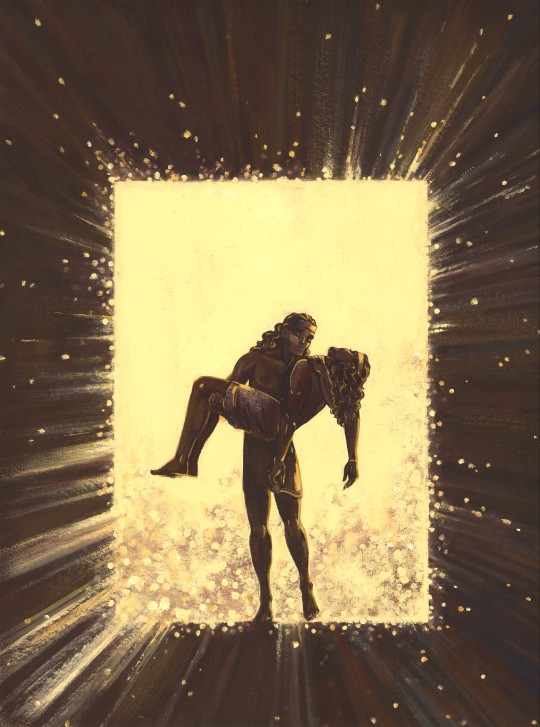
Black Sun (another version) 2024
#marysmirages#ancient greek mythology#mycenaean greece#achilles#patroclus#patrochilles#bronze age#iliad#homer#iliad homer#art#gouache painting
591 notes
·
View notes
Text
Paris: Bad things keep happening to me, like I have bad luck or something.
Hector: You don’t have bad luck. The reason bad things keep happening to you is because you’re a dumbass.
#greek mythology#greek myth#hector of troy#paris of troy#ancient greece#mythology#greek gods#mythos#greek mythos#incorrect greek mythology#incorrect quote#iliad#epic cycle#homer#iliad homer#greek myth meme#greek myth memes#myth#greek mythology memes#greek mythology meme#incorrect greek quotes#ancient troy#epic#classics#classics memes#literature#literature memes
233 notes
·
View notes
Text
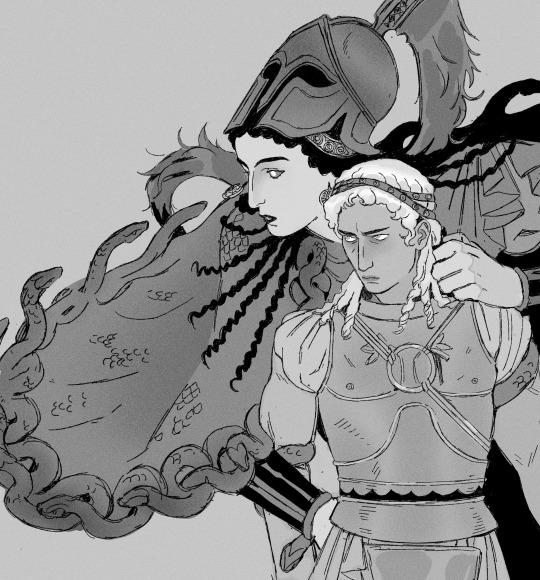
Athena holding Achilles back in the agora, first chant
18K notes
·
View notes
Text
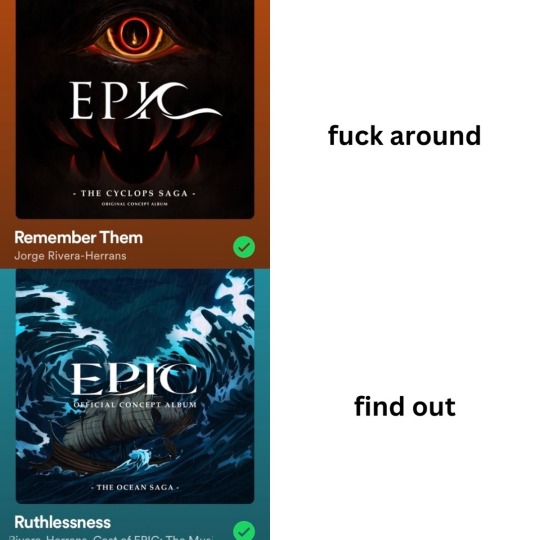
Odysseus in Epic: the musical
#Odysseus#the Iliad#homer#Greek mythology#epic the musical#epic: the ocean saga#epic: the cyclops saga#but seriously#Poseidon#jorge rivera herrans#that’s it that’s the show#odysseus of ithaca
5K notes
·
View notes
Text
To explain my chicken obsession:
* * *
Me: I’m enjoying drawing chickens for this commission.
Husband: ha ha Greek Myth Chickens!
Me: 🤔
I now present to you,
🏺Greek Myth Chickens 🐓
ILIAD EDITION
(drawn and originally posted in May 2021, coloured and reposted Jan 2023)
1) Egg-chilles and Patro-cluck (Achilles and Patroclus)
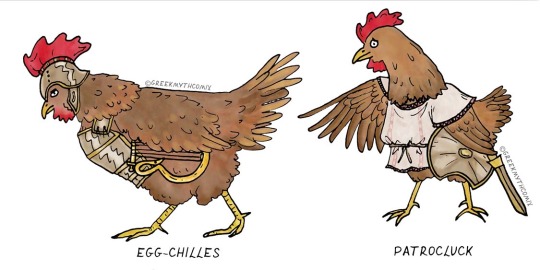
2) Mene-lay-us and Al-eggs-andros (Paris) (Menelaus and Alexandros [Paris])
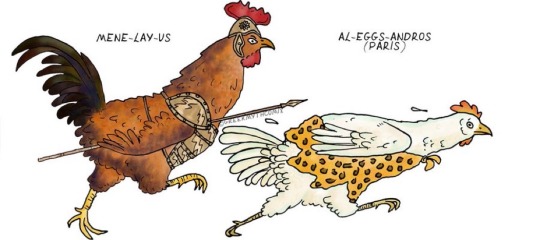
3) Egg-amemnon (Agamemnon)

4) Aph-roost-ite and Helen of Spur-ta (Aphrodite and Helen of Sparta)
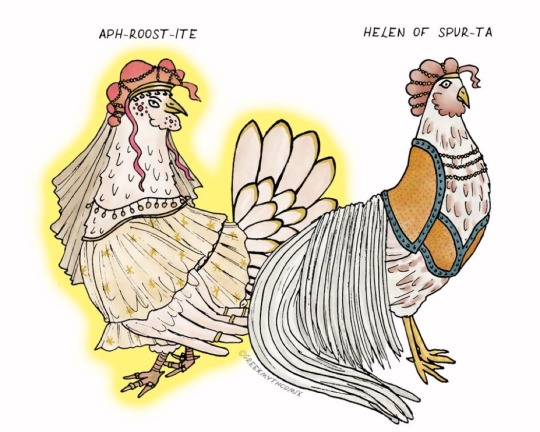
5) Nest-or (Nestor)
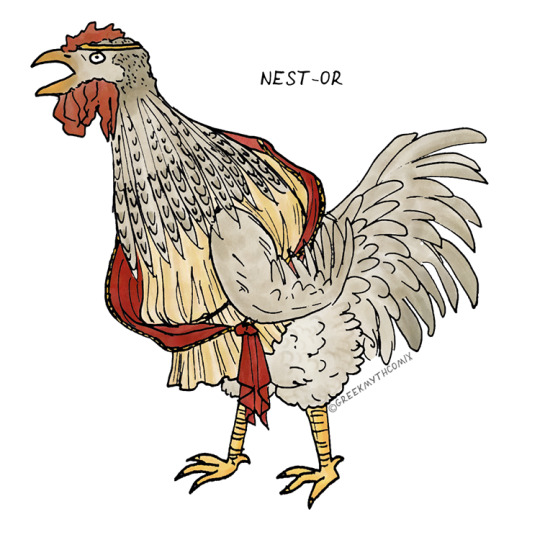
6) Androma-beak, Peck-tor, and Astyan-egg (Andromache, Hektor and Astyanax)
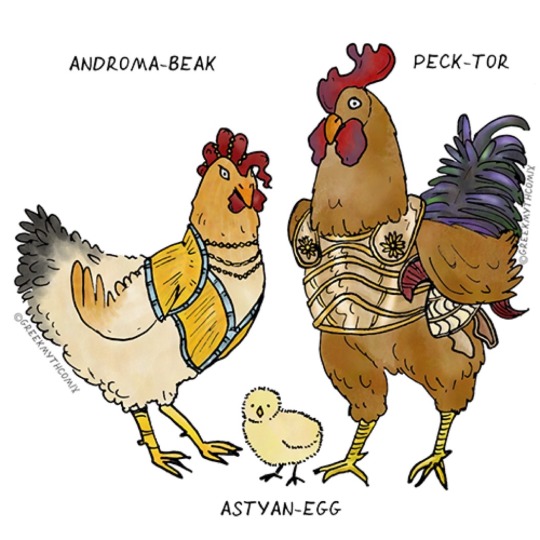
7) At-hen-a and Egg-dysseus (Athena and Odysseus)
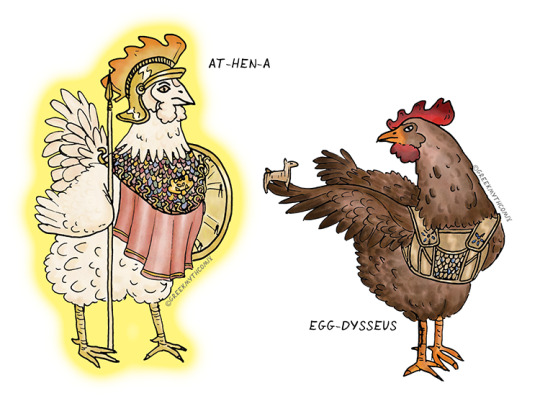
8) Preen-am and Peck-uba (Priam and Hekuba [Hekabe])
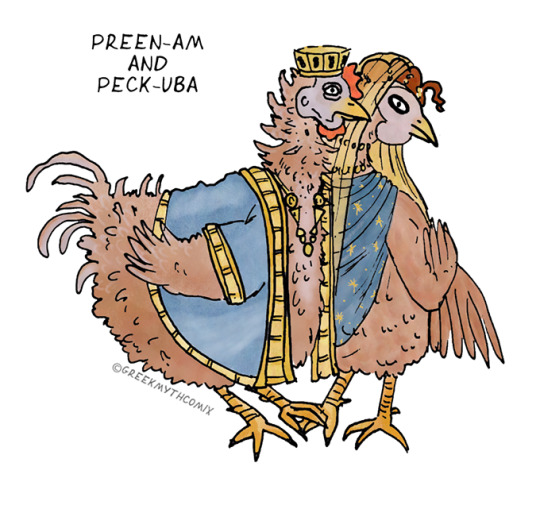
9) Brood-seis (Briseis)
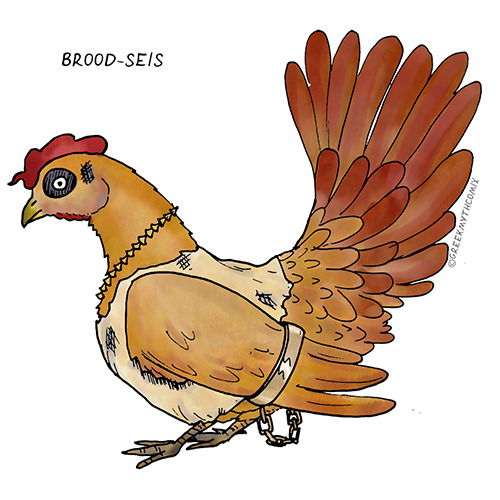
10) Diom-egg-es (Diomedes)
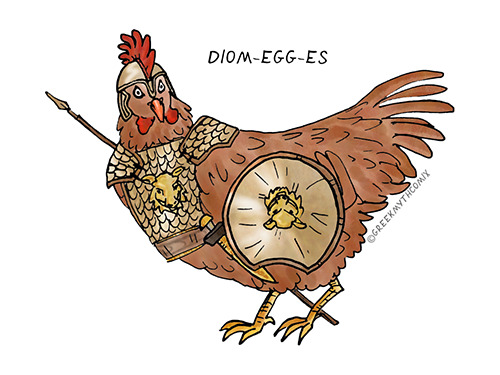
EDIT: Greek Myth and Roman History chicken MASTERPOST - https://www.tumblr.com/greekmythcomix/725538723329179648/greek-myth-roman-history-chickens-master-post Here Be More Chickens Cosplaying
(See next post for last 3 Iliad chickens- https://www.tumblr.com/greekmythcomix/722218945873051648/iliad-chickens-continued-11-lay-jax-tel-capon )
#Achilles#Patroclus#patroklos#akhilles#greek mythology#greek myth retellings#greek myth#comix#greek myth memes#Iliad#Homer#artwork#my artwork#Greek myth chickens#illustration#pun#fanart#chickens#tagamemnon#the Iliad#classics#classical civilisation
11K notes
·
View notes
Text
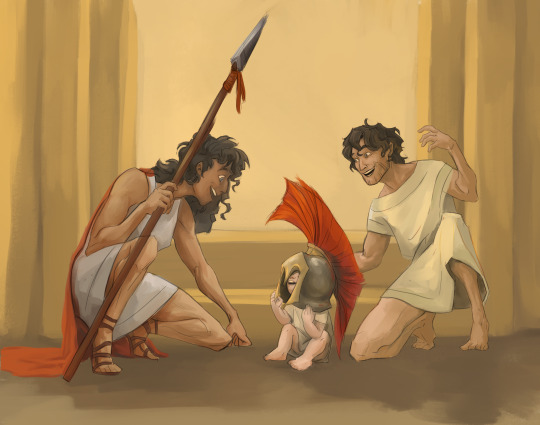
Young Odysseus introduces his son to the goddess Athena
(Alternative title: Telemachus meets his fairy Godmother)
Creator’s note:
Does this picture look blurry to you? Like even if you click on the image to enlarge it? I don’t know why but I can’t seem to get tumblr to show the full resolution image. I worked hard to make faces that actually look like faces for once but now they’re just blurry blobs 😭. Anybody know how to fix? EDIT: thank you all for the feedback! I’m glad it is not blurry for you!
#the odyssey#odyssey fanart#odysseus#telemachus#tagamemnon#greek mythology#greek mythology fanart#greek myth art#Athena#greek gods#epic the musical#The iliad#Trojan war#homers odyssey#classics
5K notes
·
View notes
Text
Im reading the iliad for this first time and im going to die priam is out here like "who is that short, hairy man" and helens like "thats odysseus" and hes just like "damn thats right he was at my house"
#the iliad#odysseus#homer#greek mythology#greek literature#live read#sorry#but youre all going to hear#my thoughts#this is my journal
3K notes
·
View notes
Text
i will never stop thinking about this poem my greek professor showed us







35K notes
·
View notes
Text
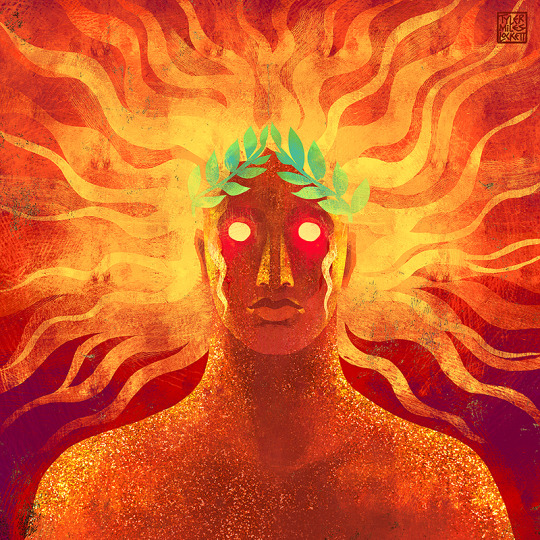
Hey folks, this image of Apollo was done for a private commission. Xoxo
The following text is reposted from my previous Apollo Olympians image.
“Phoebus, of you even the swan sings with clear voice to the beating of his wings, as he alights upon the bank by the eddying river Peneus; and of you the sweet-tongued minstrel, holding his high-pitched lyre, always sings both first and last…And so hail to you, lord! I seek your favor with my song.” (-Homeric Hymn, translated by H.G. Evelyn white)
APOLLO (uh-PAH-low), God of prophecy, oracles, music, art, protector of and disease of boys and men, and archery. Just as his twin sister Artemis is patron to women and girls, Apollo is both protector, and killer from disease of boys and men. In my Illustration the god holds his bow and arrows behind, while he strums the lyre gifted to him by trickster Hermes. Near the sun flies his ally and divine messenger, a white raven. The column on the right is capped with a cow, representing his sacred animal as a god of herds. The serpent Python sits dead at his feet, killed by Apollo’s arrow so that the god could take over the Delphi temple location. The temple complex sits beneath the god, while on the far right, the Pythia (Apollo’s oracle priestess) sits upon a tripod, breathing the hallucinatory gasses seeping up from the earth to get her prophecies which she bestows upon visitors.
The laurel tree has associations with Apollo because the god, chasing a Naiad (water nymph) named Daphne call out to Gaia (mother earth) for help, who transformed the nymph into a laurel tree, which the god adopted as his sacred tree. In book 1 of the Iliad, Apollo supports the Trojans by raining down a plague on the Greeks, and later helping Paris to kill Achilles. Apollo’s cruelty is shown in Ovid’s mythical lyre contest with the inventor of the flute; a satyr named Marsyas. When Apollo suggested they play their instruments upside down, the satyr lost, and was flayed (skinned) alive as punishment for his hubris.
#pagan#hellenism#greek mythology#tagamemnon#mythology tag#percyjackson#dark academia#greek#greekmyths#classical literature#percy jackon and the olympians#pjo#homer#iliad#classics#mythologyart#art#artists on tumblr#odyssey#literature#ancientworld#ancienthistory#ancient civilizations#ancientgreece#olympians#greekgods#zeus#hesiod
4K notes
·
View notes
Text
"I think Homer outwits most writers who have written on the War [fantasy archetype], by not taking sides.
The Trojan war is not and you cannot make it be the War of Good vs. Evil. It’s just a war, a wasteful, useless, needless, stupid, protracted, cruel mess full of individual acts of courage, cowardice, nobility, betrayal, limb-hacking-off, and disembowelment. Homer was a Greek and might have been partial to the Greek side, but he had a sense of justice or balance that seems characteristically Greek — maybe his people learned a good deal of it from him? His impartiality is far from dispassionate; the story is a torrent of passionate actions, generous, despicable, magnificent, trivial. But it is unprejudiced. It isn’t Satan vs. Angels. It isn’t Holy Warriors vs. Infidels. It isn’t hobbits vs. orcs. It’s just people vs. people.
Of course you can take sides, and almost everybody does. I try not to, but it’s no use; I just like the Trojans better than the Greeks. But Homer truly doesn’t take sides, and so he permits the story to be tragic. By tragedy, mind and soul are grieved, enlarged, and exalted.
Whether war itself can rise to tragedy, can enlarge and exalt the soul, I leave to those who have been more immediately part of a war than I have. I think some believe that it can, and might say that the opportunity for heroism and tragedy justifies war. I don’t know; all I know is what a poem about a war can do. In any case, war is something human beings do and show no signs of stopping doing, and so it may be less important to condemn it or to justify it than to be able to perceive it as tragic.
But once you take sides, you have lost that ability.
Is it our dominant religion that makes us want war to be between the good guys and the bad guys?
In the War of Good vs. Evil there can be divine or supernal justice but not human tragedy. It is by definition, technically, comic (as in The Divine Comedy): the good guys win. It has a happy ending. If the bad guys beat the good guys, unhappy ending, that’s mere reversal, flip side of the same coin. The author is not impartial. Dystopia is not tragedy.
Milton, a Christian, had to take sides, and couldn’t avoid comedy. He could approach tragedy only by making Evil, in the person of Lucifer, grand, heroic, and even sympathetic — which is faking it. He faked it very well.
Maybe it’s not only Christian habits of thought but the difficulty we all have in growing up that makes us insist justice must favor the good.
After all, 'Let the best man win' doesn’t mean the good man will win. It means, 'This will be a fair fight, no prejudice, no interference — so the best fighter will win it.' If the treacherous bully fairly defeats the nice guy, the treacherous bully is declared champion. This is justice. But it’s the kind of justice that children can’t bear. They rage against it. It’s not fair!
But if children never learn to bear it, they can’t go on to learn that a victory or a defeat in battle, or in any competition other than a purely moral one (whatever that might be), has nothing to do with who is morally better.
Might does not make right — right?
Therefore right does not make might. Right?
But we want it to. 'My strength is as the strength of ten because my heart is pure.'
If we insist that in the real world the ultimate victor must be the good guy, we’ve sacrificed right to might. (That’s what History does after most wars, when it applauds the victors for their superior virtue as well as their superior firepower.) If we falsify the terms of the competition, handicapping it, so that the good guys may lose the battle but always win the war, we’ve left the real world, we’re in fantasy land — wishful thinking country.
Homer didn’t do wishful thinking.
Homer’s Achilles is a disobedient officer, a sulky, self-pitying teenager who gets his nose out of joint and won’t fight for his own side. A sign that Achilles might grow up someday, if given time, is his love for his friend Patroclus. But his big snit is over a girl he was given to rape but has to give back to his superior officer, which to me rather dims the love story. To me Achilles is not a good guy. But he is a good warrior, a great fighter — even better than the Trojan prime warrior, Hector. Hector is a good guy on any terms — kind husband, kind father, responsible on all counts — a mensch. But right does not make might. Achilles kills him.
The famous Helen plays a quite small part in The Iliad. Because I know that she’ll come through the whole war with not a hair in her blond blow-dry out of place, I see her as opportunistic, immoral, emotionally about as deep as a cookie sheet. But if I believed that the good guys win, that the reward goes to the virtuous, I’d have to see her as an innocent beauty wronged by Fate and saved by the Greeks.
And people do see her that way. Homer lets us each make our own Helen; and so she is immortal.
I don’t know if such nobility of mind (in the sense of the impartial 'noble' gases) is possible to a modern writer of fantasy. Since we have worked so hard to separate History from Fiction, our fantasies are dire warnings, or mere nightmares, or else they are wish fulfillments."
- Ursula K. Le Guin, from No Time to Spare, 2013.
#ursula k. le guin#homer#quote#quotations#the iliad#trojan war#storytelling#fantasy#fiction writing#war#conflict#tragedy#john milton#paradise lost#greek mythology
2K notes
·
View notes
Text

The City of Troy from the Sea by François-Louis Schmied
#françois louis schmied#art#city#troy#sea#odyssey#the odyssey#homer#the iliad#iliad#europe#european#history#trojan#greek#greece#ancient greece#ancient greek#mediterranean#classical#antiquity#ancient#architecture
3K notes
·
View notes
Photo

Thousand ships in the Milky Sea (2020)
#iliad#iliad homer#patrochilles#achilles#patroclus#milky way#ships#marysmirages#bronze age#ancient greek mythology#mycenaean greece#art#painting#drawing#illustration#mystical#thousandships#achilles x patroclus
418 notes
·
View notes
Text
"Ugh classics are so boring" Classics:
Iliad, book II, vv. 257-264
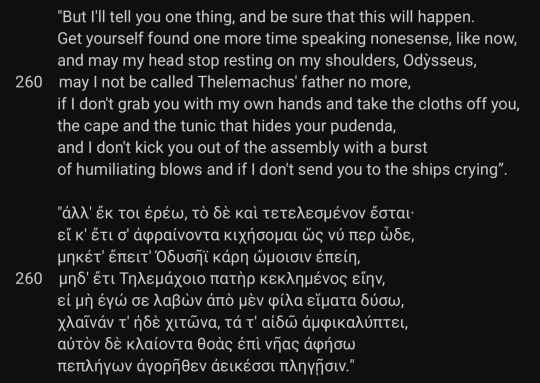
1K notes
·
View notes
Text
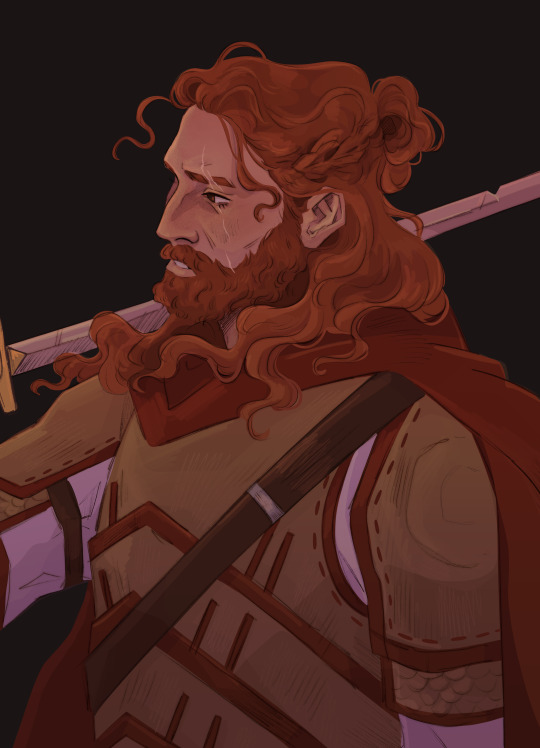
Long hair won out in the end rip all the short haired Menelaus truthers
Art used as reference from littleulvar on twitter: https://twitter.com/littleulvar https://twitter.com/littleulvar/status/1210636583713591296
#His hair is looking ORANGE#Homer like his hair is auburn :/ it’s auburn if u reduce the saturation smh#He turned out weirdly viking esque?? I think it’s the braided hair ??#Majestic if I do say so myself#Menelaus#greek mythology art#my art#the Iliad#trojan war#Greek myth#a#Also an ATTEMPT was made at Bronze Age armour#I don’t know if my reference was reliable#fuck it we ball
4K notes
·
View notes
Text
The EPIC Circe Saga making Odysseus' love for Penelope what ultimately saves him from Circe just healed a massive hole in my heart.
Because YES the Odyssey like all of Ancient Greek Mythology has a misogynist streak a mile wide, but that primarily comes down to the written text, preserved by Athens--no one hates women more than Athens--and translated into English for centuries by sexist men who wanted to see a powerful woman tamed by a man.
But the Odyssey and the Iliad come from ancient oral tradition. They were told and retold and everyone, EVERYONE, got a say in how to interpret them. Why can't we?
Why can't the story be: Odysseus' love for his wife and his family is what saves him. Hermes tells him the only way to protect himself from Circe is to seduce her. Agamemnon, who lied and betrayed his wife, warns him that trusting women will get him killed. But Odysseus doesn't listen. Instead, he passes Circe's test of character where others failed. He trusts Penelope and does right by her and she does the same for him. The secret of their marriage bed serves as a symbol of loyalty and commitment upheld by them both, not just Penelope.
Why can't it be that? Greek Myth is already brutal, why do we have to willfully make it more so?
#I will never stop losing my mind over the iliad and the odyssey#odysseus and penelope are the original power couple#greek mythology#epic the musical#epic the circe saga#odysseus#penelope#circe#the odyssey#homer
848 notes
·
View notes
Text
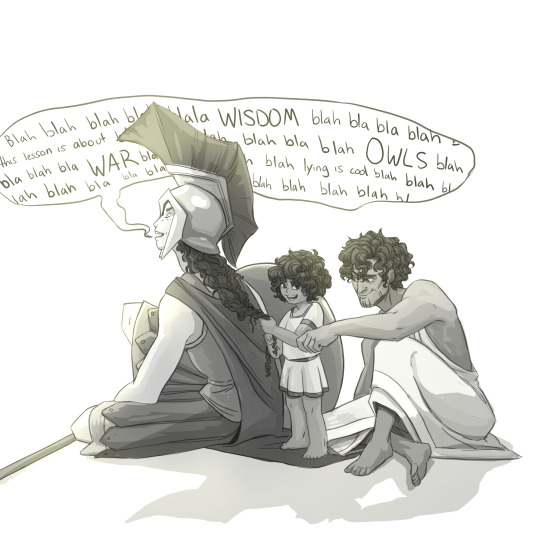
The Odyssey, but if Odysseus just got to stay home and chill with his son and goddess bestie.
been obsessing over this musical project lately.
Can't stop imagining the moments Odysseus missed. Little mischievous joys, teaching moments etc. In this scene, Odysseus teaches Telemachus how to braid hair and Athena shares profound wisdom with two of her favorite mortals.
#Epic the musical#Athena#Telemachus#the Odyssey but happy#odysseus#the odyssey#odyssey#ithaca#greek mythology#greek myth retellings#greek myth art#odyssey fanart#fanart#my art#trojan war#tagamemnon#the iliad#Iliad#homers odyssey#homers iliad
2K notes
·
View notes